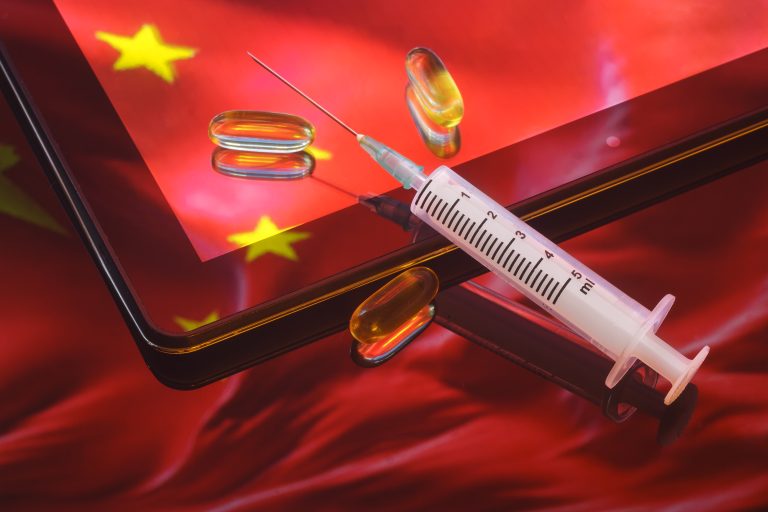Story Highlights
- The FDA has reported its first drug shortage as a result of the COVID-19 outbreak in China.
- Many drug ingredients and finished drug products used in the U.S are sourced and manufactured in China.
- The possibility of potential drug shortages highlights the issue of how the U.S. is heavily reliant on China for drugs.
The United States Food and Drug Administration (FDA) has reported its first shortage of a drug in the United States due to the novel coronavirus (COVID-19) outbreak that began in China in December 2019 and, by March 11, 2020, had been declared a global pandemic by the World Health Organization (WHO).1 2
The FDA has declined to publically disclose the name of the drug and has stated that the shortage is related to a manufacturing location in China that was impacted by the COVID-19 outbreak.1 Measures taken by Chinese officials to prevent the spread of the new viral infection has disrupted manufacturing businesses, causing drug shortages in the United States.3
According to the FDA’s website:
A manufacturer has alerted us to a shortage of a human drug that was recently added to the drug shortages list. The manufacturer just notified us that this shortage is related to a site affected by coronavirus. The shortage is due to an issue with manufacturing of an active pharmaceutical ingredient used in the drug. It is important to note that there are other alternatives that can be used by patients. We are working with the manufacturer as well as other manufacturers to mitigate the shortage.4
Many Drugs Used in the U.S are Sourced from China
The U.S. is a major exporter of drugs from China. It also relies on China for many active pharmaceutical ingredients (APIs), the main ingredient in a drug and the part that produces the intended effects, such as acetaminophen included in Tylenol and other combination drugs.3 Marianne Udow-Phillips, executive director of the Center for Health and Research Transformation at the University of Michigan said that many of the manufacturing plants in China produce a majority of ingredients used to manufacture finished drugs distributed in the U.S.5 Udow-Phillips says that, “Supply chain disruptions could be truly serious for our access to drugs.”5
The FDA has said that it has been in contact with more than 180 drug manufacturers to remind them of legal requirements for notifying the FDA of any anticipated supply disruptions but also asking them to evaluate their entire supply chain, including APIs and other components manufactured in China.3 The agency has also identified about 20 other drugs distributed in the U.S. by drug companies, which solely source their APIs or finished drug products from China.4
The manufacturing of drugs is now a global enterprise. Ingredients for one drug may be sourced from multiple countries, while the finished product may be completed elsewhere.3 The number of facilities overseas that manufacture active ingredients for pharmaceutical products distributed in the U.S. has increased, particularly in China. There are several reasons for this, including cheaper labor costs and less stringent environmental and government regulations for manufacturing drug ingredients in China, which are then sold to other countries like the U.S.5
India Limits Drug Exports
India, the world’s largest supplier of generic drugs has restricted exports of 26 ingredients and drugs made using them. One of the restricted drugs includes Paracetamol (acetaminophen), one of the world’s most widely used drugs to relieve pain and reduce fevers.6
The restricted exports are related to measures taken to stop the spread of COVID-19, which has closed down many API manufacturers in China. India’s drug makers rely on China for almost 70 percent of the active ingredients in their medicines. Analyst Shaun Rein from the China Market Research Group stated that, “Even drugs that aren’t produced in China get their base ingredients from China. Globally there could be a shortage if China and India both get hit.”6
In 2018, drugs imported from India accounted for almost a quarter of U.S drugs and more than 30 percent of drug ingredients.6
Preventing Drug Shortages Act (H.R. 6080)
Responding to potential drug supply chain issues due to COVID-19-related shutdown of manufacturing plants in China, legislation was recently introduced in the U.S House of Representatives addressing the drug shortage.7
The Preventing Drug Shortages Act (H.R. 6080) was introduced on March 4, 2020 by U.S. Representative Richard Hudson (NC-08) joined by Representatives Scott Peters (CA), Eliot Engel (NY), Brett Guthrie (KY), Anna G. Eshoo (CA), Michael McCaul (TX), Kurt Schrader (OR), and Gus Bilirakis (FL)8 The bill would help mitigate shortages by enhancing transparency throughout the drug supply chain process and strengthening FDA inter-agency efforts to avoid drug shortages. The bill would also empower the FDA to enforce greater reporting standards on drug and active pharmaceutical ingredient makers to identify and correct vulnerabilities in their supply chains.8
According to Rep. Eshoo:
The coronavirus outbreak has demonstrated how susceptible our nation’s drug supply chain is to disruptions that could have devastating impacts on our public health because of our overreliance on China for generic drugs. The coronavirus has already caused one shortage and it’s unclear if there are more to come.7
Americans Do Not Realize Where Prescription Drugs are Made
The American consumer does not know exactly where the drugs that doctors prescribe for them to use are sourced.3 According to Erin Fox, PharmD, an associate professor at the University of Utah and an expert on drug shortages, “It’s just literally the one thing that we buy in the US that we have literally no information about,” She adds that, “You know more about your water bottle that you’re going to buy or your clothing or your food than you know about purchasing a drug.”3
References:
1 Locelace Jr. B. FDA reports first coronavirus-related drug shortage. CNBC Feb. 28, 2020.
2 World Health Organization. WHO Director-General’s opening remarks at the media briefing on COVID-19. Mar. 11, 2020.
3 Kirby J. Could the coronavirus spark drug shortages in the US? Vox Mar. 9, 2020.
4 Commissioner of Food and Drugs. Coronavirus (COVID-19) Supply Chain Update. FDA.gov Feb. 27, 2020.
5 Bomey N. Coronavirus spurs fears of drug shortages as outbreak disrupts the medicine supply chain. USA Today Mar. 6, 2020.
6 BBC. Coronavirus: Drug shortage fears as India limits exports. Mar. 4, 2020.
7 Blank C. Drug Shortages Act Needed As Coronavirus Threats Grow. DrugTopics.com Mar. 12, 2020.
8 Congressman Richard Hudson. Hudson Introduces Preventing Drug Shortages Act in Wake of Coronavirus. Hudson.house.gov Mar. 5, 2020.













6 Responses
if it is from China it likely will not work-and may be toxic to boot.
This article illustrates the corruption and incompetence of our mis-leadership for the last 50 years or so. How is this not a national security issue? This along with foreign made defense components and foreign control of our money supply by private banks. The deliberate destruction of our space program so we have to buy rocket engines from our adversaries. The us once built the largest rocket ever made. It was deliberately destroyed along with the tooling while the nation was distracted with political mischief. During the same decade our medical system was privatized to provide a new profit center for a group of parsites who only objective is profit. Where is the greatest medical system in the world during this pandemic? Billions of dollars on defense spent yet on 9/11 cave dwellers with box cutters defeat all of that and destroy lives and buildings. A political system that does not require any certification of competence to lead. Instead it ewards the most convincing liars. And media that consists of “All lies all the time”. Had enough yet?
CUT THE CORD!!!
When is the US government going to bring back all the factories that make things Americans use to the USA like it was before world trade????? World trade is where all our new bugs, diseases, pests etc., come from? It don’t take a brain surgeon to understand this!!! I think this all might be a part of the one world government moving in on us while we sleep.
A good lot of our (U.S.) drugs was rebuilt into unincorporated territory, Puerto Rico–where the citizens cannot vote in U.S. elections. There are 80 drug factories there. Annually, when the place is wrecked by hurricanes, the US Taxpayer bails it out. But that’s still better than the communist crap from Chinamanlandiana.
_ China drugs & foods & products got very bad publicity, mid 2000s, so that got censored better. CEOs and importer/exporters are just improbably greedy.
_ IT WOULD BE NATIONAL SECURITY, IF IT WERE NOT EXECUTIVE BRANCH alphabet ‘AGENCY’ high HIGH PROFITS. Laws allow those overpaid jackals to make additional wealth, by patents, etc. AND the bribes from pharmaceutical co’s are the biggest ever seen.
_ Robert F. Kennedy explained it this way: big {pig} pharma bribes twice as much as Oil & Gas ever did/could. O&G bribed twice as much as aerospace/planes/military-industrial complex.
_ ==>>>We NEED The D.J. T-Rump to fire many E.B. Agency heads, as he tried with the DOJ & FBI. (Digression: Note the U.S. Constitution allowed No federal police.)
_ In 1985, CONgressjacks were bribed (& alarmed) to change law to protect vaccine MFRs. Since then, it’s been a free-for-all at the CDC, FDA, et al.
_ YOU are NOT “Represented.”
When is the US government going to cut loose pharma and the AMA, which suppress homeopathy, herbalism, and other alternative treatments that work just as well as, and often far better than, pharmaceuticals. Why is there a monopology on medicine? Corruption, payoffs, and patents.